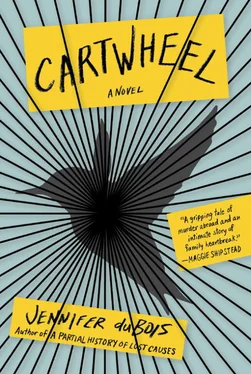That night, Lily was on her best behavior with the Carrizos. She showed up to dinner early, asking Beatriz if she needed help with anything—though she was sure Beatriz could see her visibly hoping that help would not be needed—and decided to make a particular point to be more gracious to Katy. With Carlos, she knew, it would be easy: All she had to do to make him like her even better was to talk even more—about the plotting of multinational corporations, the undeniably imperialistic ambitions of the United States, the dastardly scheming of the IMF. Lily was dimly aware that she did not strictly believe all of this stuff—a lot of it was the kind of talk you engage in to socialize, to announce your well-honed moral identity—but she was certainly not going to quibble with an actual citizen of a developing economy about the intentions of the IMF. And at any rate, Lily was not wholly sure that Carlos really believed in all of it entirely, either. He regarded conversation as sport, and Lily loved anyone who regarded anything in life as sport (except for actual sports).
“Nobody even believed there were weapons of mass destruction in Iraq,” she said to Carlos, to start things off. She poured herself a glass of wine.
“Nobody,” he said forcefully. “That’s the big deception. Now everyone knows they were wrong, but what nobody understands is that even they never thought they were right.”
Lily nodded cheerfully. Maybe you could see Carlos’s depression underneath it all, though it was so different from the resigned white-knuckled terminal WASP depression of her own family. Carlo’s sadness wasn’t the grim death march of Maureen’s—who had basically made a studied and understated decision to simply never enjoy anything again, ever. Instead, it seemed to push Carlos toward a fatal indifference that almost seemed like a kind of freedom. He probably laughed as much as he did anything.
“George W. Bush’s unresolved daddy issues are the only reason you guys were even there,” Carlos was saying.
Katy and Beatriz stayed mostly quiet when politics was discussed, which it always was. This made Lily vacillate between the dark suspicion that Katy was politically ignorant and the even darker suspicion that she might be politically moderate. Beatriz, she figured, was just bored of Carlos, which Lily could understand.
“The felling of the Twin Towers was a symbolic castration of America,” said Lily. “That’s why the U.S. took it so hard.” Somehow the mood at the table was darkening. Beatriz was grimacing into her steak with slightly more than her usual amount of exasperated chagrin. Lily looked at Katy for backup, but Katy stared at her levelly with what Lily thought might be some degree of tired amusement. Lily was alone.
The conversation bobbled onward, and Lily found herself issuing ever less provocative assertions and ever more lukewarm assents until she noticed that Beatriz had cleared the table and Katy had left the room and all that was left in the wine bottle was a few grainy ruby-red drips.
Afterward Lily found Katy on the bunk bed, reading. Lily stared at her for a moment, wondering what kind of perfect thoughtlessness could buy you such serenity. “What’s that about?” she said.
“Governmental secrecy about inflation rates,” said Katy, not looking up.
Lily didn’t mean to say anything, and then she did. “Why don’t you ever talk?”
“What?”
“Why don’t you ever say anything at dinner? Don’t you have any opinions on anything?”
Katy put down the article. “You’re not serious.”
“How would I know if you did? How would I know if you had a single opinion in your head?”
“There is no possible way you want me in that conversation.”
“Of course I do.”
“No. You don’t.”
“You’re never going to change anyone’s mind by sitting there and rolling your eyes.”
“I wasn’t rolling my eyes.”
“You were. You were rolling your eyes as far back in your head as they would go.” Lily could feel the wine sluicing somewhere back in her skull. She hiccupped. “I think you never want to say anything because you just can’t stand to have someone mad at you. You just want to make sure everyone likes you. That’s all you care about.”
“Better than just wanting to feel right all the time, even if you’re not actually doing anything to fix anything.”
“I was the vice president of Amnesty International!” said Lily, throwing her shoe at Katy. It missed her by a wide margin. “I organized three petitions for a Free Palestine!”
Katy looked at the flip-flop appraisingly, then picked it up and handed it to Lily. “Calm down,” said Katy. “We don’t need to fight about it.”
There was a pause. Lily hoped she looked less angry than she actually was.
“Maybe you’re right,” said Katy soothingly. “It’s just—I don’t know. I don’t think they’re good conversations. I don’t think they’re good for Carlos. He gets so drunk. He’s so depressed.”
“I am so sick of everyone being so depressed,” said Lily. She was. Good Lord, how she was. Sometimes she felt like her own family was essentially the world’s most passive suicide cult. Couldn’t her host family at least have a different set of problems? “Doesn’t anyone understand that you have to try not to be depressed?” said Lily. “You have to make it a marginal priority? You can’t just get a free pass on your whole reality because you’re so depressed? We’re all going to be dead one day. We’re all in the same boat.”
Katy let this pass, and Lily could hear what she’d said swirl around the room in widening loops. She felt suddenly wretched and childish. She felt, suddenly and for the first time, like she wanted to go home.
“Why is he so depressed, though?” Lily said after a while.
Katy gave her a marveling look. “They’re being sued,” she said. “He’s losing the business. Don’t you pay attention to anything?”
February
The night after visiting the jail, Andrew dreamed of Lily. In his dream she was swaddled in an incubator, with tubes running in and out of her ears and eyes and nose. She was soft featured and infantile, yet the size of his adult daughter, and when she spoke—although Andrew could not understand what she said—she spoke with his adult Lily’s low voice, clear and pleading, until he woke up.
Andrew was disappointed with himself. His whole life, his dreams had been dispiritingly common, crudely metaphorical, and always right on schedule: He’d dreamed of falling, he’d dreamed of unnoticed nakedness, he’d dreamed of forgetting about a class he was signed up to take, and later, to teach. He would have liked to at least be a little more original in a crisis.
Andrew got up and went to the bathroom. He turned on the light and watched himself appear, paunchy and red-eyed, in the mirror. Andrew had spent the last few years tracking his own aging through Maureen—both in how she looked and in how she looked at him—each time he saw her. The last time, at Christmas, Andrew had realized that Maureen had dimmed into typicality: There were feathery wrinkles around her eyes and a persistent plummy color underneath; her hair was never quite as red as he remembered. It had finally happened: The best things about Maureen no longer showed. A stranger passing her on the street would never guess that she’d once jumped onto a train in Austria, or that she’d smoked dope in her closet and fallen down laughing into a pile of skirts, long before things happened that had made her fearful, that would make anybody in the world fearful. Joyous openness was, after all, a luxury. And sometimes Andrew was glad that Lily had somehow emerged from their lives carefree enough to do all the things she wanted to do. Other young girls felt this way, after all, and they went off on study abroad, and then after a semester they came home, behaving exactly as Lily would have: pretending to slip into Spanish or French by accident, ostentatiously mourning some newly beloved street food, telling stories they hoped would make other people admire their intrepidness as much as they themselves did. That’s what Lily should have been doing in three months’ time—she should have been out with her friends, all of them recently returned from different places, all of them exclaiming over how strange and light and leathery American dollars now seemed. But she would not be. Lily might be home in three months—but even if she was, she would no longer be a child, and she would not be saying the things that children say. And sometimes—especially now, when he thought of her sleeping in that cell, curled into herself for warmth—Andrew was not glad that she had had a chance to feel free and lucky in the world. Not even for a moment, not even if she deserved it. Because, really, who were they kidding? Their family had never been lucky. And Andrew and Maureen had failed Lily—failed her utterly—if they’d ever let her forget it.
Читать дальше












